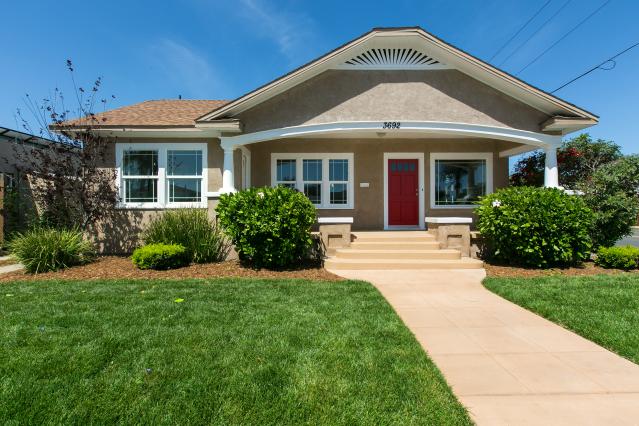Why Fake Grass is Gaining Popularity
Want a picture-perfect lawn? Maybe fake grass is the answer. It solves watering, weeding, and fertilizing woes. But is it perfect?
If you live in a low-water area, or if you’re just tired of constant lawn maintenance, you’re in good company.
More homeowners are saving time, water — and their backs — by switching from real grass to artificial turf.
Synthetic grass for landscaping and recreation is growing 10% to 15% a year in the U.S.
That means more and more homeowners are using fakes for:
- Lawns
- Dog runs
- Play areas
- Pool surrounds
- Rooftops
- Putting greens
- Decorative borders between patio pavers
Faking It is Right for You If:
- You're tired of watering, weeding, fertilizing, and cutting real grass.
- Your summer water bills are too high.
- You don’t want to use chemical fertilizers and herbicides.
- You believe artificial grass looks as good as real grass — maybe better.
What Exactly is Artificial Grass?
Fake grass consists of filaments threaded into a backing that lets water through. The backing is laid on a drainage layer, usually compacted gravel, and fastened along the perimeter. Then it’s filled with recycled crumb rubber or sand to keep it from blowing away in a stiff breeze.
Today’s synthetic grass is made of nylon, polyethylene, or polypropylene that’s colored to look like various species.
Synlawn, one of the largest manufacturers of synthetic grass, offers: SYNBermuda, SYNFescue, SYNZoysia — you get the idea. Some grasses even have a thatch layer that makes a yard look less Stepford-like and more realistic.
Let’s Talk Money
Artificial grass comes with a big upfront cost — $5 to $20 per square foot, installed. Once it’s down, it’s free for the next 15 to 25 years.
Professionally laid sod, on the other hand, costs only 14 to 60 cents per square foot. But that’s where expenditures (and upkeep) begin. You’ve got to water, mow, fertilize — all of which cost money and take time.
Let’s crunch some numbers on a hypothetical 500-square-foot yard.
First year costs:
| Artificial Grass | |
| Installation ($12.50/sq. ft. average) | $6,250 |
| Natural Sod | |
| Installation (37 cents/sq. ft. average) | $185 |
Annual costs:
| Artificial Grass | |
| Watering | n/a |
| Fertilizing | n/a |
| Gardener/Lawn Man | n/a |
| Annual Total: | $0 |
| Natural Sod | |
| Watering ($15/month for 6 months) | $90 |
| Fertilizing (20 cents/sq. ft.) | $100 |
| Gardener/Lawn Man ($25/week for 26 weeks) | $650 |
| Annual Total: | $840 |
So, it would take about seven years for maintenance-free artificial grass to recoup its initial cost. If you’re planning on staying put for longer than that, you’ll begin to save money each year.
What are the Good Points of Artificial Grass?
- It saves water.
- It's easy to maintain.
- Synthetic grass can be environmentally friendly.
The Southern Nevada Water Authority says a home owner saves 55 gallons of water per year for every square foot of natural grass replaced with synthetic. Plus, some water companies in drought-prone areas will offer a cash rebate for artificial grass, up to $1 per square foot.
You’ve got to blow off leaves and other debris, and hose off pet waste. But there’s no mowing, seeding, edging, and fertilizing — lawn maintenance chores that take the average home owner about 150 hours per year, says Ted Steinberg, author of “American Green: The Obsessive Quest for the Perfect Lawn.”
The Synthetic Turf Council says synthetic lawns’ recycled crumb rubber infill keeps 20 million rubber tires out of landfills every year.
What are the Drawbacks?
- It’s not completely maintenance-free.
- It can’t absorb and break down pet urine.
- It heats up in direct sun.
- It can’t be recycled.
- Some HOAs and municipalities ban fake grass.
Weeds can still grow in the dust or rotted leaves that can accumulate; so, you’ll have to spend time blowing or raking.
If you don’t hose off pet runs regularly, they’ll stink.
It radiates heat to surrounding people, pets, trees, and buildings. Shade trees, which prevent real grass from growing, will prevent fake grass from getting too hot.
Although the industry is working on ways to recycle old synthetic grass, currently fakes end up in landfills.
Alternatives to Fake Grass
- Low-Maintenance Turf Grasses
- Natural Lawn Replacement Ideas
Or, if you want to green up your lawn in a hurry, try lawn paint.
 Facebook
Facebook
 X
X
 Pinterest
Pinterest
 Copy Link
Copy Link
